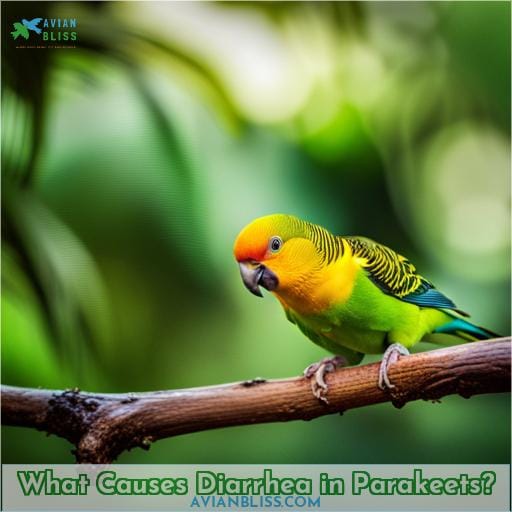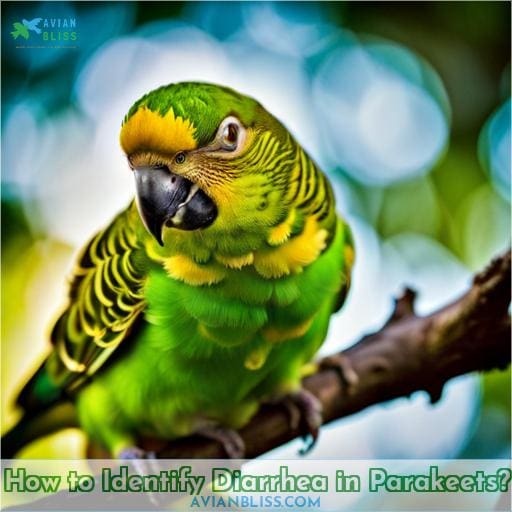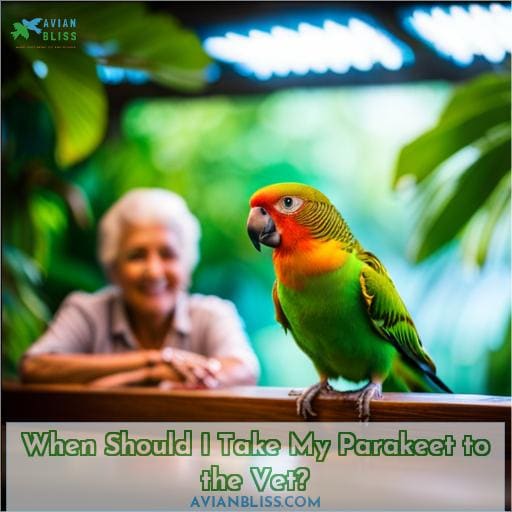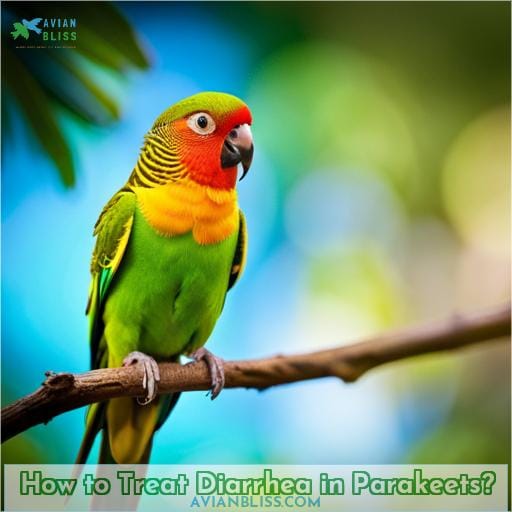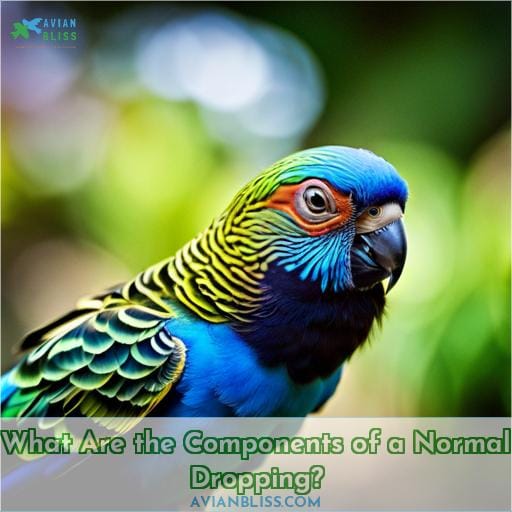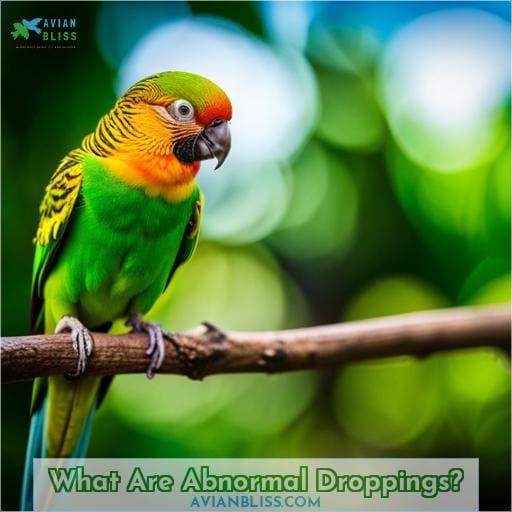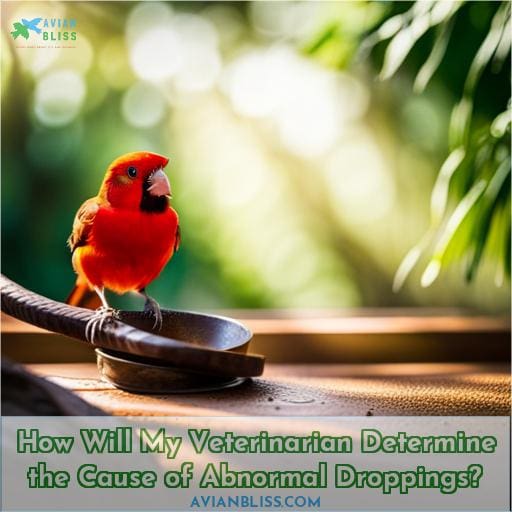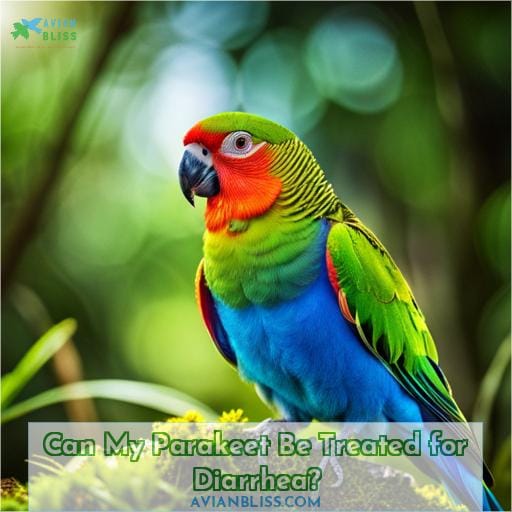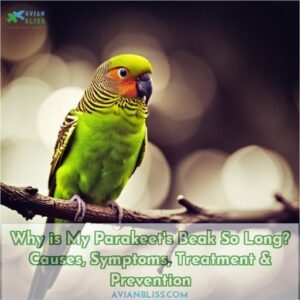This site is supported by our readers. We may earn a commission, at no cost to you, if you purchase through links.
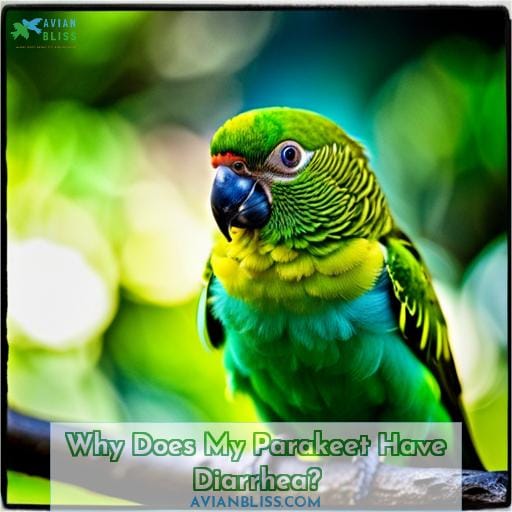 Discovering why your parakeet has diarrhea is crucial for their health and well-being.
Discovering why your parakeet has diarrhea is crucial for their health and well-being.
In this article, we will explore the common causes of diarrhea in parakeets, how to identify it, when to seek veterinary care, and effective treatment options.
By understanding the factors that contribute to this condition and taking appropriate action, you can help your feathered friend recover quickly and prevent any further complications.
Let’s dive into the world of parakeet health together!
Table Of Contents
- Key Takeaways
- What Causes Diarrhea in Parakeets?
- How to Identify Diarrhea in Parakeets?
- When Should I Take My Parakeet to the Vet?
- How to Treat Diarrhea in Parakeets?
- What Are the Components of a Normal Dropping?
- What Are Abnormal Droppings?
- How Will My Veterinarian Determine the Cause of Abnormal Droppings?
- Can My Parakeet Be Treated for Diarrhea?
- Frequently Asked Questions (FAQs)
- Can stress alone cause diarrhea in parakeets?
- Are there any over-the-counter medications I can give my parakeet to treat diarrhea?
- How long does it typically take for diarrhea in parakeets to resolve with treatment?
- Is there a specific diet I should follow for my parakeet with diarrhea?
- Can diarrhea in parakeets be contagious to other pets or humans?
- Conclusion
Key Takeaways
- Common causes of diarrhea in parakeets include bacterial, viral, and parasitic infections, as well as toxins and a high-fat or hard-to-digest diet.
- Identifying diarrhea in parakeets can be done by observing symptoms such as lethargy, ruffled feathers, loss of appetite, vomiting or regurgitation, and abnormal droppings.
- It is important to consult a veterinarian when dealing with diarrhea in parakeets for proper diagnosis, preventive measures, dietary adjustments, home care guidance, and monitoring of the bird’s condition.
- Treatment for diarrhea in parakeets may involve separating the bird to prevent infection spread, providing a warm environment, administering oral fluids and probiotics, maintaining cage sanitation, and making necessary dietary changes.
What Causes Diarrhea in Parakeets?
Diarrhea in parakeets can be caused by a variety of factors, including illnesses, stress, and diet.
Illnesses such as viral or bacterial infections can disrupt the normal digestive function and lead to diarrhea.
Additionally, stressors like changes in routine or environment can also contribute to gastrointestinal upset in parakeets.
Lastly, an improper diet that’s high in fat or difficult to digest may result in loose stools for your feathered friend.
Illnesses
If your parakeet is experiencing diarrhea, it may be caused by various illnesses.
Some of the common causes include:
- Bacterial infections
- Viral infections
- Parasitic infections
- Toxins
These illnesses can lead to dehydration in your bird if left untreated.
It’s important to take your parakeet to the vet for a proper diagnosis and treatment plan that may involve antibiotics or other medications.
Prompt veterinary care is crucial in preventing further complications and ensuring a quick recovery for your feathered friend.
Stress
Stress can be a significant factor in causing diarrhea in your parakeet.
When birds experience stress, it can lead to changes in their droppings and various symptoms such as lethargy, tucking the head under the wing, ruffled feathers, and loss of appetite.
To address stress-related diarrhea in parakeets, it’s important to remove or minimize the stress triggers and provide a calm environment.
Additionally, offering supportive care at home with proper nutrition and fluids can help alleviate symptoms.
Diet
To understand why your parakeet may be experiencing diarrhea, it’s important to consider the role that diet plays in causing gastrointestinal upset.
High-fiber foods like fruits and vegetables are beneficial for a healthy digestive system. On the other hand, fatty foods, seeds, and nuts should be avoided as they can lead to loose stools.
If your parakeet has diarrhea, you may want to try feeding them a bland diet of rice and boiled chicken or incorporate probiotics such as yogurt or kefir into their meals.
It’s also crucial to ensure proper fluid replacement by offering Pedialyte or water regularly.
How to Identify Diarrhea in Parakeets?
To identify diarrhea in your parakeet, you should look for both physical symptoms and changes in their droppings.
Physical symptoms may include:
lethargy
ruffled feathers
loss of appetite
vomiting or regurgitation
In terms of droppings, abnormal signs can include:
changes in color or texture of the fecal component or urate component
presence of blood
bubbly appearance to the droppings
an increase in watery or liquid component.
Monitoring these indicators will help you determine if your parakeet is experiencing diarrhea.
Physical Symptoms
To identify diarrhea in your parakeet, look for physical symptoms such as:
- Lethargy
- Ruffled feathers
- a decrease in appetite
You may also notice your parakeet:
- Tucking its head under its wing
- displaying blood in its stool
These signs indicate that your bird is experiencing diarrhea and should be monitored closely.
If you observe any of these symptoms, it’s important to take prompt action to address the underlying cause of the diarrhea and provide appropriate treatment for your feathered friend’s well-being.
Changes in Droppings
If your parakeet is experiencing diarrhea, it’s important to pay attention to any changes in their droppings. Abnormal droppings can indicate a problem and help identify if your bird has diarrhea.
Look for:
- Changes in the color or texture of the fecal component or urate component
- An increase in watery or liquid components like polyuria
- Presence of blood
- Large volumes of clear liquid
Monitoring these changes can provide valuable information for diagnosis and treatment by a veterinarian.
When Should I Take My Parakeet to the Vet?
If your parakeet is showing signs of diarrhea, it’s important to take them to the vet for a proper diagnosis and treatment.
- Diagnosing Causes: A vet will be able to determine the underlying cause of your parakeet’s diarrhea through various diagnostic tests such as examining droppings under a microscope or conducting direct fecal smears.
- Preventive Measures: Early intervention can prevent further complications and help minimize the spread of potential infections among other birds in your household.
- Dietary Adjustments: Your vet may recommend specific dietary adjustments that can help alleviate symptoms and promote digestive health in your parakeet.
- Home Care Guidance: Vets provide valuable guidance on how to care for an ill bird at home, including maintaining appropriate temperature levels, administering oral fluids properly, giving probiotics if necessary, and monitoring improvements or worsening conditions closely.
Consulting with a veterinarian ensures that you receive expert advice tailored specifically for your beloved feathered friend’s condition.
How to Treat Diarrhea in Parakeets?
To treat diarrhea in your parakeet, there are several steps you can take:
- First, separate the bird from other birds to prevent the spread of infection.
- Provide a warm environment and give oral fluids to prevent dehydration.
- Administer probiotics and follow any prescribed medications or treatments recommended by your vet.
- Keep the cage clean and consider making dietary changes if necessary.
- Finally, remove any stress triggers that may be contributing to the diarrhea.
Separating the Bird
If you notice that your parakeet has diarrhea, it’s important to separate the bird from other birds in order to prevent the spread of infection.
Once separated, it’s recommended to take your parakeet to a vet for diagnostic procedures and proper treatment.
Additionally, maintaining cage hygiene by regularly cleaning and disinfecting can help prevent the spread of infections.
Making dietary adjustments may also be necessary depending on the cause of diarrhea, such as avoiding foods high in fat or sugar.
Providing a Warm Environment
To treat diarrhea in your parakeet, provide it with a warm environment. This will help prevent dehydration and promote healing.
Additionally, consider the following steps to effectively manage your parakeet’s diarrhea:
- Make necessary dietary adjustments
- Seek veterinary interventions for proper diagnosis and treatment
- Implement stress management techniques
- Practice sanitary practices to prevent further infection or spread of disease
Giving Oral Fluids
To treat diarrhea in your parakeet, you should give it oral fluids to prevent dehydration.
Dehydration can be a serious complication of diarrhea and can lead to further health issues for your bird.
By providing small amounts of water or electrolyte solution every few hours, you can help keep your parakeet hydrated during this time.
Additionally, giving probiotics can also be beneficial in restoring the balance of bacteria in their digestive tract.
Make sure to follow any recommendations from your vet regarding fluid administration and dietary adjustments for optimal results.
Administering Probiotics
To help treat diarrhea in your parakeet, you can administer probiotics to restore the balance of bacteria in its digestive tract.
Probiotics have numerous benefits for your bird’s health and can aid in resolving gastrointestinal issues. However, it’s essential to consult with a veterinarian before giving any probiotic supplements to ensure proper dosage and suitability for your parakeet’s specific condition.
Additionally, dietary considerations, cage hygiene practices, stress management techniques, and veterinary guidance should be followed for effective treatment.
Prescribed Medications
First, your veterinarian may prescribe antibiotics or antifungals to treat the underlying infection causing diarrhea in your parakeet.
These medications are aimed at eliminating the harmful bacteria or fungi responsible for the diarrhea.
It’s important to follow your vet’s instructions carefully and administer the prescribed medications as directed.
Be aware of any potential side effects that may occur and monitor your parakeet’s progress closely.
If there are any concerns or lack of improvement, contact your veterinarian for further guidance.
Sanitizing the Cage
Keep your parakeet’s cage and accessories clean to prevent the spread of infection.
Regularly cleaning and disinfecting the cage is essential in maintaining good hygiene practices for your bird.
Use mild disinfectants to sanitize all surfaces, including perches, toys, food bowls, and water dispensers.
Remove any soiled bedding or droppings promptly to maintain a clean environment for your parakeet.
By implementing preventive measures such as proper cage cleanliness, you can help reduce the risk of diarrhea in your feathered friend.
Dietary Changes
To help treat diarrhea in your parakeet, you should make dietary changes.
A nutritional imbalance can contribute to digestive issues, so it’s important to provide a balanced and varied diet for your bird.
Environmental factors such as stress or poor water quality can also affect their digestion.
Consider changing the seed variety and avoid overusing treats, as they may be difficult for the bird to digest.
Be mindful of their overall nutrition and make necessary adjustments for a healthy gut.
Removing Stress Triggers
To help treat diarrhea in your parakeet, it’s important to remove any stress triggers that may be causing or exacerbating the condition.
Cage enrichment and environmental changes can provide mental stimulation and reduce stress levels.
Providing a variety of toys for your parakeet to play with can also help alleviate boredom and promote positive behavior.
Additionally, altering their routine periodically and increasing social interaction can contribute to a healthier overall well-being for your feathered friend.
What Are the Components of a Normal Dropping?
Now that you know how to treat diarrhea in parakeets, it’s important to understand what constitutes a normal dropping.
Normal droppings consist of three components:
- The fecal or stool component
- The urate or solid urine component
- The clear liquid urine component.
These components should be present in balanced proportions.
On the other hand, abnormal signs in droppings can indicate potential health issues for your parakeet.
- Changes in color or texture of either the fecal component or urate component
- Bubbly-looking droppings
- Increased watery or liquid content (polyuria)
- Presence of blood
- Pea soup consistency of feces
- Large volumes of clear liquid.
If you notice any abnormal signs in your parakeet’s droppings consistently over time,you should seek veterinary diagnosis as soon as possible.
It is crucial to remember that early detection and prompt treatment are key factors for successful recovery.
In addition to veterinary care,the article will also discuss home care methods along with preventive measures.
What Are Abnormal Droppings?
Abnormal droppings in parakeets can indicate a variety of health issues. It’s important to be able to identify these abnormal droppings in order to address any underlying problems.
Here are some characteristics of abnormal droppings:
- Change in color or texture of either the fecal component or the urate component
- Bubbly looking droppings
- Increase in the watery or liquid component (called polyuria)
- Presence of blood
When you notice any abnormalities, it’s crucial to take your parakeet for diagnostic tests and consult with a veterinarian for proper diagnosis and treatment options. In addition, dietary considerations should be taken into account when addressing abnormal droppings.
Home care involves keeping your bird warm and providing oral fluids if necessary.
How Will My Veterinarian Determine the Cause of Abnormal Droppings?
Your veterinarian will determine the cause of abnormal droppings in your parakeet through a series of diagnostic tests and examinations.
- Diagnostic Tests:
- Your vet may conduct various tests such as a complete blood count (CBC), blood chemistry profile, radiographs (x-rays), and microscopic examination of the droppings under a microscope.
- Dropping Analysis:
- The veterinarian will carefully analyze the color, texture, consistency, and presence of any abnormalities in your parakeet’s droppings to gather important clues about its health condition.
- Avian Examinations:
- A thorough physical examination will be performed on your parakeet to check for any signs or symptoms that could indicate an underlying illness or infection causing the abnormal droppings.
By combining these diagnostic approaches, veterinarians can accurately diagnose the cause behind your parakeet’s abnormal droppings and recommend appropriate treatment approaches tailored specifically for their needs.
Additionally, they may provide preventive measures to help you maintain good avian health moving forward.
Can My Parakeet Be Treated for Diarrhea?
Your parakeet can indeed be treated for diarrhea, but it’s important to consult with a veterinarian to determine the underlying cause and appropriate treatment plan. The success of the treatment will depend on several factors, including your compliance with medication administration and implementing dietary adjustments.
Your vet may prescribe antibiotics or antifungals if necessary, along with probiotics to restore healthy gut bacteria. Additionally, managing stress triggers in your parakeet’s environment can help prevent recurrence of diarrhea episodes.
It’s crucial that you follow all instructions provided by your vet and ensure medication compliance throughout the course of treatment. By addressing these aspects and working closely with your veterinarian, you have a higher chance of successfully treating your parakeet’s diarrhea and preventing future episodes from occurring.
Frequently Asked Questions (FAQs)
Can stress alone cause diarrhea in parakeets?
Yes, stress alone can cause diarrhea in parakeets.
Stress disrupts the balance of bacteria in their digestive tract and weakens their immune system.
Providing a calm environment and addressing any sources of stress can help alleviate the diarrhea.
Are there any over-the-counter medications I can give my parakeet to treat diarrhea?
While there are no over-the-counter medications specifically designed to treat diarrhea in parakeets, it’s important to consult with a veterinarian.
They can provide the best course of action for your bird’s health and well-being.
How long does it typically take for diarrhea in parakeets to resolve with treatment?
Typically, with proper treatment, diarrhea in parakeets can resolve within a few days to a week.
It’s important to follow the veterinarian’s recommendations and monitor your bird closely for any changes or worsening symptoms during this time.
Is there a specific diet I should follow for my parakeet with diarrhea?
To help treat your parakeet’s diarrhea, it’s important to follow a specific diet.
Avoid giving them foods high in fat or sugar and opt for easily digestible options.
This will aid in their recovery process and promote overall digestive health.
Can diarrhea in parakeets be contagious to other pets or humans?
Diarrhea in parakeets can be contagious to other birds, but it isn’t typically transmitted to humans or other pets.
It’s important to isolate the bird and take proper precautions to prevent spreading the infection.
Conclusion
Ultimately, understanding why your parakeet has diarrhea is essential for their overall health and well-being. By identifying the common causes and knowing when to seek veterinary care, you can effectively treat this condition and prevent further complications.
Whether it’s due to illnesses, stress, or diet, taking appropriate action such as providing a warm environment, administering probiotics, and making dietary changes can help your feathered friend recover quickly.

